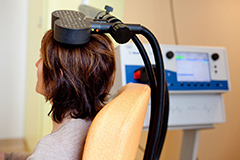Magnetic Mind Control
Transcranial magnetic stimulation (TMS) is a form of neurostimulation. TMS is a non-invasive procedure in which a changing magnetic field is used to cause electric current to flow in a small targeted region of the brain via electromagnetic induction. During a TMS procedure, a magnetic field generator, or "coil", is placed on the scalp. The coil is connected to a pulse generator, or stimulator, that delivers a changing electric current to the coil.
 TMS is used diagnostically to measure the connection between the central nervous system and skeletal muscle to evaluate damage in a wide variety of disease states, including stroke, multiple sclerosis, amyotrophic lateral sclerosis, movement disorders, and motor neuron diseases.
TMS is used diagnostically to measure the connection between the central nervous system and skeletal muscle to evaluate damage in a wide variety of disease states, including stroke, multiple sclerosis, amyotrophic lateral sclerosis, movement disorders, and motor neuron diseases.
Evidence suggests it is useful for neuropathic pain and treatment-resistant major depressive disorder. A 2015 Cochrane review found that there was not enough evidence to determine its effectiveness in treating schizophrenia. For schizophrenia negative symptoms another review found possible efficacy. As of 2014, all other investigated uses of repetitive TMS have only possible or no clinical efficacy.
Matching the discomfort of TMS to distinguish true effects from placebo is an important and challenging issue that influences the results of clinical trials. Adverse effects of TMS are uncommon, and include fainting and rarely seizure. Other adverse effects of TMS include discomfort or pain, hypomania, cognitive changes, hearing loss, and inadvertent current induction in implanted devices such as pacemakers or defibrillators. More details
 TMS is used diagnostically to measure the connection between the central nervous system and skeletal muscle to evaluate damage in a wide variety of disease states, including stroke, multiple sclerosis, amyotrophic lateral sclerosis, movement disorders, and motor neuron diseases.
TMS is used diagnostically to measure the connection between the central nervous system and skeletal muscle to evaluate damage in a wide variety of disease states, including stroke, multiple sclerosis, amyotrophic lateral sclerosis, movement disorders, and motor neuron diseases.Evidence suggests it is useful for neuropathic pain and treatment-resistant major depressive disorder. A 2015 Cochrane review found that there was not enough evidence to determine its effectiveness in treating schizophrenia. For schizophrenia negative symptoms another review found possible efficacy. As of 2014, all other investigated uses of repetitive TMS have only possible or no clinical efficacy.
Matching the discomfort of TMS to distinguish true effects from placebo is an important and challenging issue that influences the results of clinical trials. Adverse effects of TMS are uncommon, and include fainting and rarely seizure. Other adverse effects of TMS include discomfort or pain, hypomania, cognitive changes, hearing loss, and inadvertent current induction in implanted devices such as pacemakers or defibrillators. More details
